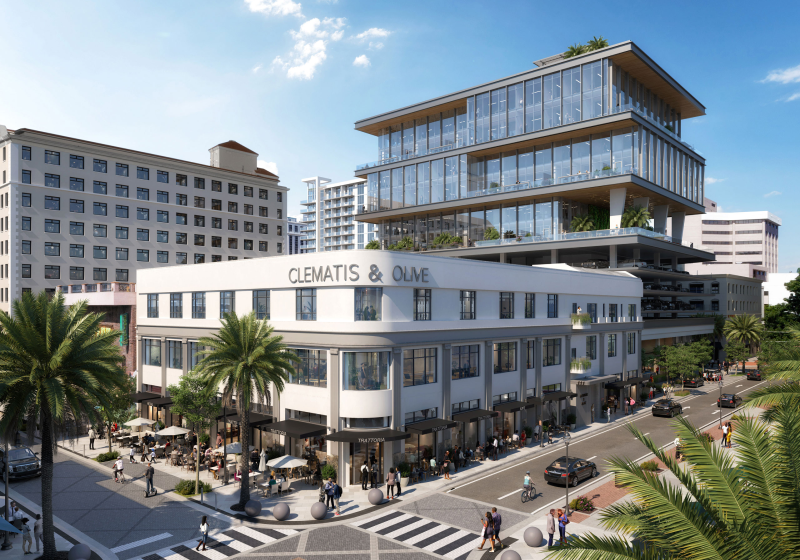Big Tenants Are Ditching CBDs For Low-Rise Buildings On the Outskirts – Here’s Why
May 3, 2023
FREE REPORT: Learn to crack the code with options with this free report. Expert-level options plays available now.
High-rise office buildings in central business districts (CBDs) across the country are struggling to boost their occupancy as people embrace remote or hybrid working rather than return to their cubicles.
But innovative developers aren’t giving up on offices just yet. Instead, they’re adapting to the workforce’s preference of being in smaller buildings in walkable neighborhoods that are closer to where they live. For a company that wants its employees to show up at the office, it’s the best way to attract and retain talent.
“No one really wants to commute a long distance,” said Jane Luger, a vice president at New York development firm Taconic Partners. “Having an office close to where your main workforce is coming from is invaluable.”
Taconic Partners Essex Crossing in Manhattan’s Lower East Side, which has retail and entertainment at street level, has drawn large companies like Verizon, which is leasing half of the building’s 350,000 square feet of office space on the podium level.
Tenants are attracted to the more intimate space and a location that gives them access to the highly desirable Gen Z workforce.
“The neighborhood isn’t a tried-and-true office submarket, so it’s a great opportunity for someone to plant their flag,” Luger said. “Verizon did extensive research on community and access to a young, educated workforce, and this location proved out in every way, shape and form.”
Turnbridge Equities also has attracted large companies that are traditionally located in CBD high rises to its Music Lane development in Austin, Texas. Deloitte, Gensler and Tritium Partners are finding inspiration in the South Congress neighborhood, which didn’t have any office space until the project was built, said Andrew Joblon, Turnbridge’s founder and managing principal.
“Austin was ready for a different offering,” Joblon said. “Low-rise boutique offerings in walkable neighborhoods are more appealing than tall towers in the CBD, which gets quiet at night. If you’re in a big building, you don’t have a presence there. If you’re in a smaller building, you feel like it’s your own ecosystem.”
Options 101: The Beginner’s Guide
Want to become an options master? In his free report, options expert Nic Chahine will give you access to the four bulletproof tips for beginners, the secret to scoring 511% gains with options, and his time-tested “plan” for success. Grab your free copy of Options 101: The Beginner’s Guide ASAP.
The development, which has ample outdoor space that often is used for meetings and conference calls, is fully leased and Joblon says he gets calls from prospective tenants weekly asking whether any space is available.
“A lot of it has to do with the neighborhood,” Joblon said. “It’s not shiny glass — it feels like adaptive reuse, but it’s new construction with great parking. These companies ultimately made the decision because it’s all about talent acquisition. If you offer something different, that’s going to tip the scales.”
Now that Brand Atlantic Real Estate Partners is nearing completion of the renovation of a historic building at 111 Olive in West Palm Beach, the development firm is getting inquiries about the space from potential tenants primarily in the financial services industry, said Andrew Dance, the company’s managing partner.

Dance said the companies relocating to West Palm Beach now are doing so with more intention than they did in the early days of the pandemic when it was more about the CEO wanting to live in a big house in Florida.
“Early on, it was knee-jerk,” Dance said. “Now it’s deliberate. Companies are extremely focused on attracting and retaining talent. Pre-pandemic, people would stomach the worst parts of their jobs — riding a commuter train, the isolation of an office park and being tethered to a desk in a really tall tower with no natural light.”
“Post-pandemic, employees and employers are seeing boutique buildings of less than 200,000 square feet as more interesting. Companies are looking at these buildings and their surrounding settings as a place where people want to spend time. The name of the game right now is getting people into the office.”
Looking for a way to boost returns? Benzinga’s Real Estate Offering Screener has the latest private market investments with offerings available for both accredited and non-accredited investors.







